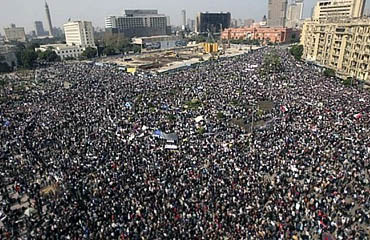
Among the key demands raised at Friday's protests were an end to military trials of civilians, the dismissal and prosecution of police officers accused of killing protesters, and speedy and transparent trials for former regime officials.
Sharaf vowed to meet the demands of the protesters, promising swift trials of Mubarak regime officials.
He "ordered the the creation of a panel to review the trials (of those accused of) killing protesters and corruption as soon as possible," without waiting until after the judicial summer recess.
"The public prosecutor will appeal all rulings acquitting people in those cases," Sharaf said.
He said he would also create "a mechanism for dialogue with all the political forces."
But the speech received a cold reaction from activists.
Longtime activist Mohammed Waked, a member of the Justice and Democracy Front, rejected the speech as "emtpy rhetoric."
Waked told AFP that protesters want to see all police officers accused of torture face justice, including those who practised it before the revolution.
"There are many police officers accused of torture before the revolution, some were even sentenced, and they are still showing up for work. This is not serious," he said.
Riham Abdel Salam, 23, who has been demonstrating in Tahrir Square -- the epicentre of protests that ousted Mubarak-- said there were many demands not addressed.
Abdel Salam said Sharaf made no mention of an end to the military trials of civilians, a central demand of protesters.
Protesters who first took to the streets to topple Mubarak have recently directed their anger at the Supreme Council of the Armed Forces, which took power when the veteran strongman was ousted in February over the pace of reforms.
The military has also come under fire for alleged abuses, after the January 25 uprising that left 846 people dead and more than 6,000 injured.
Pro-democracy activists have vowed to continue protesting until all their demands are met.
Hundreds were also participating in sit-ins in the Mediterranean city of Alexandria and the canal city of Suez.
Mubarak, who is in custody in hospital in the Red Sea resort of Sharm el-Sheikh, is due to face trial along with his two sons, Alaa and Gamal, on August 3.
Several former ministers are currently in jail on charges of corruption, but activists have criticised the handling of legal proceedings, demanding a transparent and thorough process for the sake of justice, not revenge, they say.
---------------------------------------------------------------------------------
Sharaf vowed to meet the demands of the protesters, promising swift trials of Mubarak regime officials.
He "ordered the the creation of a panel to review the trials (of those accused of) killing protesters and corruption as soon as possible," without waiting until after the judicial summer recess.
"The public prosecutor will appeal all rulings acquitting people in those cases," Sharaf said.
He said he would also create "a mechanism for dialogue with all the political forces."
But the speech received a cold reaction from activists.
Longtime activist Mohammed Waked, a member of the Justice and Democracy Front, rejected the speech as "emtpy rhetoric."
Waked told AFP that protesters want to see all police officers accused of torture face justice, including those who practised it before the revolution.
"There are many police officers accused of torture before the revolution, some were even sentenced, and they are still showing up for work. This is not serious," he said.
Riham Abdel Salam, 23, who has been demonstrating in Tahrir Square -- the epicentre of protests that ousted Mubarak-- said there were many demands not addressed.
Abdel Salam said Sharaf made no mention of an end to the military trials of civilians, a central demand of protesters.
Protesters who first took to the streets to topple Mubarak have recently directed their anger at the Supreme Council of the Armed Forces, which took power when the veteran strongman was ousted in February over the pace of reforms.
The military has also come under fire for alleged abuses, after the January 25 uprising that left 846 people dead and more than 6,000 injured.
Pro-democracy activists have vowed to continue protesting until all their demands are met.
Hundreds were also participating in sit-ins in the Mediterranean city of Alexandria and the canal city of Suez.
Mubarak, who is in custody in hospital in the Red Sea resort of Sharm el-Sheikh, is due to face trial along with his two sons, Alaa and Gamal, on August 3.
Several former ministers are currently in jail on charges of corruption, but activists have criticised the handling of legal proceedings, demanding a transparent and thorough process for the sake of justice, not revenge, they say.
---------------------------------------------------------------------------------









 Home
Home Politics
Politics









